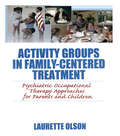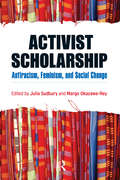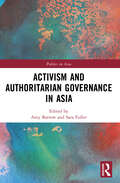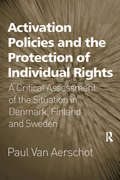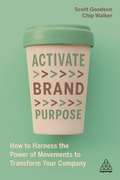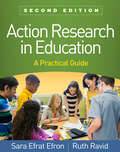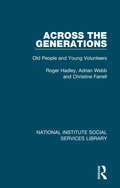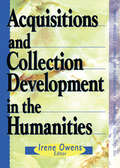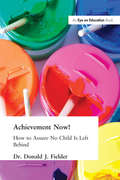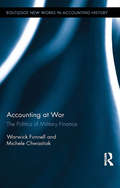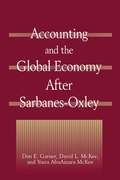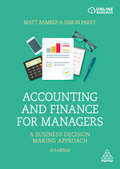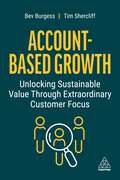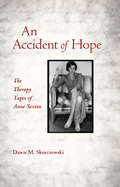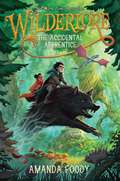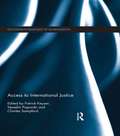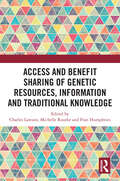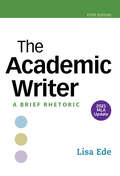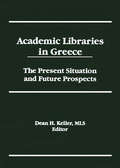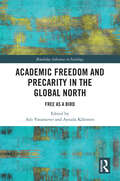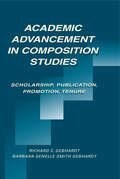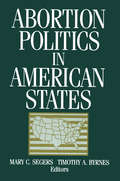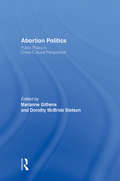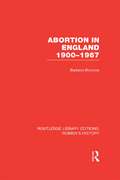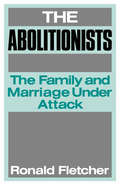Special Collections
Benetech’s Global Certified Accessible Titles
Description: Benetech’s GCA program is the first independent third-party EPUB certification to verify ebook accessibility. By creating content that is born accessible, publishers can meet the needs of all readers. Learn more: https://bornaccessible.benetech.org/
- Table View
- List View
Activity Groups in Family-Centered Treatment
by Laurette OlsonGet the tools for practical family-based interventions for children or adolescents with mental illness Providing parent-child occupation-based interventions can be one of the most important therapeutic services offered to children or parents with mental illness and their families. Activity Groups in Family-Centered Treatment: Psychiatric Occupational Therapy Approaches for Parents and Children provides useful in depth how to strategies into the processes of providing family occupation-based group intervention when a child has a mental illness. Occupational therapists working with children or parents with mental illness can learn valuable practical interventions to apply in their own clinical work.Cherished activities that strengthen parent-child bonds are many times lacking in families that include a child or parent with mental illness. Activity Groups in Family-Centered Treatment describes valuable parent-child occupation-based interventions with detailed examples of how they have been provided in therapy. This text provides an overview of the literature related to providing family-based psychiatric OT treatment for children and their families, a framework for providing services, rich descriptions of a parent-child activity group, a parent-adolescent activity group, and case studies of inpatient and home-based occupation based interventions.Topics in Activity Groups in Family-Centered Treatment include: an overview of theory and research literature on the nature of the interaction between parents and children with emotional disorders detailed case studies of family challenges with mental illness a framework for parent-child activity groups a qualitative study of a parent-child activity group analysis of the barriers that can arise in a parent-child activity group clinical experiences leading a parent-adolescent activity group analysis of the influences of culture within a parent-child activity group a case study of the intervention for a depressed mother and her family issues between parents and professionals when children are psychiatrically hospitalizedActivity Groups in Family-Centered Treatment provides occupational therapists and other professionals who lead parent-child groups or who work with families that include a child or parent with mental illness with integral tools to effectively treat their clients.
Activist Scholarship
by Margo Okazawa-Rey and Julia SudburyCan scholars generate knowledge and pedagogies that bolster local and global forms of resistance to U.S. imperialism, racial/gender oppression, and the economic violence of capitalist globalization? This book explores what happens when scholars create active engagements between the academy and communities of resistance. In so doing, it suggests a new direction for antiracist and feminist scholarship, rejecting models of academic radicalism that remain unaccountable to grassroots social movements. The authors explore the community and the academy as interlinked sites of struggle. This book provides models and the opportunity for critical reflection for students and faculty as they struggle to align their commitments to social justice with their roles in the academy. At the same time, they explore the tensions and challenges of engaging in such contested work.
Activism and Authoritarian Governance in Asia
by Amy Barrow and Sara FullerThis interdisciplinary book offers a new analysis of the concepts, spaces, and practices of activism that emerge under diverse authoritarian modes of governance in Asia. Demonstrating the limitations of existing conceptual approaches in accounting for activism in Asia, the book also offers new understandings of authoritarian governance practices and how these shape state-civil society relations. In conjunction with its tripartite theoretical framework, the book presents regional knowledge from an array of countries in Asia, with empirically rich contributions from both scholars and activists. Through in-depth case studies, the book offers new scholarly insights that highlight the ways in which activism emerges and is contested across Asia. As such, it will be of interest to students and scholars of Asian politics, law, and sociology.
Activation Policies and the Protection of Individual Rights
by Paul Van AerschotIn Denmark, Finland and Sweden the evolution of administrative law, including social welfare law, has been marked by a shift towards a stronger protection of the recipient's individual rights. The adoption of activation policies targeting recipients of social assistance has highlighted the tensions between decision-making concerning the implementation of these policies and the legislative efforts to promote the realisation of individual rights in the field of social welfare. An examination of the legislation in question and its implementation conditions shows that the realisation of individual rights is subordinated to the pursuit of organisational and other objectives. The findings of the study are used to formulate proposals for the promotion of individual rights based on the Nordic egalitarian model of citizenship. This critical assessment of activation policies should be of broad international appeal. It will be of interest to researchers in social policy, as well as those concerned with protection of rights.
Activate Brand Purpose
by Scott Goodson and Chip WalkerBeing an active, purpose-driven brand has never been more meaningful. Recent statistics prove that more than 87% of consumers would purchase a product because a company advocated for an issue they cared about, and more than two-thirds would refuse to do so if the company supported an issue contrary to their beliefs. Become a truly 'purpose-driven' brand that creates action, with this proven framework. We live in an age of activism - the conscious consumer is more socially aware than ever before, and this is reflected in their buying habits. Yet, activism on behalf of brands is lagging. While many claim to be 'purpose driven', far too often this purpose is relegated to a plaque above the CEO's desk, and never goes any further. Or, worse, the 'purpose' is transparently used as a marketing ploy, but never acted upon in any real way. Activate Brand Purpose shows readers how to transform their brand's purpose into meaningful action by sparking a company wide cultural movement, beginning internally and permeating externally. Regardless of whether your purpose is lofty and socially conscious, or all business, consumers will respond if you can prove that you care about that purpose, and that you're working to realize it, rather than simply chasing the next dollar. This book contains a clearly explained, proven framework that will make this happen. Written by a veteran of the marketing and transformation industry, and the founder of the Movement Thinking and Movement Marketing crusade, Activate Brand Purpose is the definitive guide to this transformative approach to business growth.
Action Research in Education, Second Edition
by Sara Efrat Efron and Ruth RavidAcclaimed as a text and professional development tool, this user-friendly resource has now been revised and updated, and offers expanded coverage of collaborative action research (CAR) and participatory action research (PAR). Preservice and inservice educators get crucial step-by-step guidance for conducting classroom- and school-based studies to improve their instructional practices. Organized to mirror the full cycle of action research, the book provides balanced coverage of qualitative, quantitative, and mixed methods approaches. Vivid vignettes and examples illustrate research approaches for a range of teaching and learning situations, school subjects, and age groups (PreK–12). Readers learn how research approaches are driven by the research question, as well as how to develop data collection strategies; design and/or evaluate assessment tools; interpret, analyze, report, and implement study results; and design a new cycle of research that builds on the previous one. New to This Edition *In-depth descriptions of CAR and PAR--which enable groups of teachers to work together to solve problems in a classroom or school--plus examples of both throughout the book. *Expanded or new discussions (with examples) of such topics as how research approaches and methods are driven by the research question, how to assess different types of reliability and validity, the differences between analysis and interpretation, and how to use sequential cycles of research for continuous improvement and professional development. *Fully updated references and resources. Pedagogical Features *Both individual and group exercises and activities in every chapter. *New and updated checklists and guidelines that enable busy educators to self-assess the progress and quality of their studies. *Sample templates to assist in development of research instruments. *Example boxes illustrating the components of an action research report. *Summary tables highlighting key aspects of different research strategies. *Chapter summaries (now shorter for ease of use) and suggestions for further reading.
Across the Generations
by Roger Hadley and Adrian Webb and Christine FarrellVoluntary work is sometimes praised, sometimes criticised, but was seldom the subject of objective evaluation. Given the importance of the voluntary sector in the social services at the time, the lack of systematic research into its performance was cause for concern. Originally published in 1975, the particular value of this study was twofold: first it provided a detailed and vivid picture of the work of one section of the volunteer movement – young volunteers working with the elderly; second it examined the wider issue of how voluntary work can be evaluated. The particular volunteers studied were organised through Task Force, a London based agency, but both the substantive and research issues discussed had a far wider relevance. A key part of the study explored over a period of twelve months, the development of relationships between a group of old people and the volunteers allocated to them. The authors established a new method of assessing success in these relationships. They then explored possible reasons for the successes and failures in the relationships they studied. They suggest possible changes in the organisation of the work which might help to increase the success rate of volunteer agencies. The book will be of interest to anyone concerned about the place of voluntary work in our society. At the time it would have been of special importance to staff and members of organisations involved in voluntary social service, to social workers and social administrators, and to those who were training to join their ranks. The book is based on an eighteen-month field study of Task Force; Roger Hadley and Adrian Webb directed the research and Christine Farrell was the research officer for the project.
Acquisitions and Collection Development in the Humanities
by Linda S Katz and Sally J Kenney and Helen KinsellaAcquisitions and Collection Development in the Humanities is a one-of-a-kind guide on the procedures, approaches, and principles needed to make sound decisions in acquiring materials in various areas of the humanities. It gives you an inside look at managerial concerns in documentary delivery, changing budgetary needs, and fluctuations in journal prices and helps you address many of the important questions in acquisitions and collection development within both traditional and technological environments.As contributing author Dennis Dillon puts it, the ultimate goal of humanities librarians “is not to acquire information bytes and bits, but to promote integrity: integrity of texts, integrity of selection, the integrity of the collection, and the integrity of the library and its ultimate purpose.” This objective underlies this multifaceted and comprehensive collection of articles, as the authors address many interesting issues, developments, and challenges in the field, including: selecting candidates for digitization and producing e-texts collecting in areas that don’t have immediate utility or that may be unpopular what librarians need to know about the humanities as a discipline in order to effectively meet the informational and technological needs of their constituencies online discussion groups as useful sources of webliographic information cooperative collection building the importance of maintaining a high degree of local ownership for materials the principles, criteria, and tools needed to develop a Native American studies collection document-driven and use-driven approaches to collecting acquiring and preserving records that chronicle the role played by African Americans in the United States’developmentAcquisitions and Collection Development in the Humanities can help professional librarians, graduate school faculty, and students in information and library science acquire the knowledge and skills necessary for building a broadly based and academically responsive collection. It will certainly help you keep up with changes in the information environment and show you how the tools you’ve developed for selecting traditional library materials will be useful as you grapple with electronic texts, “spider” search mechanisms on the Web, becoming a webliographer, and budget shortfalls.
Achievement Now!
by Donald FielderThis research-based book provides details on how educators can dramatically increase student achievement. It offers numerous experience-based ideas and strategies which can be applied to any school or district.This book will help you:- establish a results-oriented focus on the curriculum- increase time-on-task and academic rigor for ALL students- provide a supportive accountability system for all staff members- identify and eliminate educational practices that lower student achievement- introduce an achievement audit process that will increase student performance in any school or district
Accounting at War
by Warwick Funnell and Michele ChwastiakAccounting is frequently portrayed as a value free mechanism for allocating resources and ensuring they are employed in the most efficient manner. Contrary to this popular opinion, the research presented in Accounting at War demonstrates that accounting for military forces is primarily a political practice. Throughout history, military force has been so pervasive that no community of any degree of complexity has succeeded in. Through to the present day, for all nation states, accounting for the military and its operations has primarily served broader political purposes. From the Crimean War to the War on Terror, accounting has been used to assert civilian control over the military, instill rational business practices on war, and create the visibilities and invisibilities necessary to legitimize the use of force. Accounting at War emphasizes the significant power that financial and accounting controls gave to political elites and the impact of these controls on military performance. Accounting at War examines the effects of these controls in wars such as the Crimean, South African and Vietnam wars. Accounting at War also emphasizes how accounting has provided the means to rationalize and normalize violence, which has often contributed to the acceleration and expansion of war. Aimed at researchers and academics in the fields of accounting, accounting history, political management and sociology, Accounting at War represents a unique and critical perspective to this cutting-edge research field.
Accounting and the Global Economy After Sarbanes-Oxley
by Don E. Garner and David L McKee and Yosra AbuAmara McKeeThis book is essential for students and practitioners in accounting, international business, finance, and economics. In a straightforward and readable style, it focuses on the changing accounting and auditing standards in national and global economies in the post-Enron/Arthur Andersen era. The authors clarify the reasons behind and consequences of the accounting profession's failure in auditing and self-regulation, as most firms placed consulting profits ahead of public audit duties. They show how Sarbanes-Oxley solutions, while not perfect, are major contributors to the profession's redemption, and have enabled it to rise to new heights of service and revenue. The book offers a detailed examination of accounting practitioners' past challenges and future prospects. It provides a realistic analysis of specific issues facing accounting and auditing firms today, including the growing problem of independence; the need for one set of international accounting standards and one set of auditing standards; adjustments facing the global financial system; and the impact of the Internet and communication systems on accounting firms.
Accounting and Finance for Managers
by Matt Bamber and Simon ParryAccounting and Finance for Managers rebukes the myth that in order to excel in accounting and finance you need to be great at mathematics. Split into two broad sections which focus on financial accounting and management accounts, this textbook uses clear, accessible language that will appeal to students from a variety of academic backgrounds.Taking a uniquely practical approach that focuses on the financial aspects of business decisions, the textbook covers all the core topics of accounting and finance, including basic bookkeeping, financial analysis, business planning, cash-flow analysis and investment decisions. Now in its third edition, Accounting and Finance for Managers contains updates on new accounting standards and regulations, as well as featuring up-to-date real-world examples of real options, value chain analysis and competitive advantage analysis. This textbook features 'traditional' accounting practices in detail, but also covers topics with a strategic focus to ensure students learn to think in broader strategic terms. Written for an international audience using International Financial Reporting Standards (IFRS) terminology with supporting resources including additional exercise questions, curated further reading and lecture slides for each chapter.
Account-Based Growth
by Bev Burgess and Tim ShercliffDevelop long-term relationships, deliver market-beating growth, and create sustainable value with this pragmatic guide to aligning marketing, sales, customer success and your executives around your most important customers.Many B2B companies make half their profitable revenue from just three percent of their customers, yet don't recognize the significance of these accounts, nor invest appropriately in them. Account-Based Growth introduces a comprehensive framework for improving internal alignment and external engagement with these vital few. It contains bullet-pointed takeaways at the end of each chapter plus a comprehensive checklist to help you improve your own company's approach to its most important customers.Each element of the framework is brought to life through viewpoints from industry experts and case studies from leading organizations including Accenture, Fujitsu, Infosys, SAP, Salesforce, ServiceNow and Telstra.
An Accident of Hope
by Dawn M. SkorczewskiIn 1956, Anne Sexton was admitted into a mental hospital for post-partum depression, where she met Dr. Martin Orne, a young psychiatrist who treated her for the next eight years. In that time Sexton would blossom into a world-famous poet, best known for her "confessional" poems dealing with personal subjects not often represented in poetry at that time: mental illness, depression, suicide, sex, abortion, women's bodies, and the ordinary lives of mothers and housewives. Orne audiotaped the last three years of her therapy to facilitate her ability to remember their sessions. The final six months of these tapes are the focus of this book. In An Accident of Hope, Dawn Skorczewski links the content of the therapy with poetry excerpts, offering a rare perspective on the artist's experience and creative process. We can see Sexton attempting to make sense of her life and therapy and to sustain her confidence as a major poet, while struggling with the impending loss of Orne, who was moving elsewhere. Skorczewski's study provides an intimate, in-depth view of the therapy of a psychologically tortured yet immensely creative woman, during a period of emerging feminism and cultural change. Tracing the mutual development of the poet and the therapist during their years together, the author explores the tension between the classical therapeutic setting as practiced in the early 1960s and contemporary relational and developmental concepts in psychoanalysis, just then beginning to emerge. An Accident of Hope also raises broader questions about the nature of healing in psychotherapy. The poet and therapist we encounter in these sessions present complex and conflicted images of the therapeutic and creative process. Orne, equal parts honesty and hesitancy, works to bolster Sexton's self-image and maintain that she is more than the sum of her poetry. Sexton, working against a tendency to hide from her most painful feelings, valiantly pushes to tell the truth in therapy, while her poems invite the readers to see another side of the story. Just as Orne kept the audiotapes so that one day they might help others who suffer, An Accident of Hope tells the story of a therapy but moves beyond it. By offering a glimpse into the past, the present is open for reappraisal, both of Sexton herself and the legacy of psychoanalytic treatment.
The Accidental Apprentice
by Amanda FoodyA New York Times bestseller! A boy who accidentally bonds with a magical Beast must set off on an adventure in the mysterious Woods in this &“wholesome, delightful&” (Kirkus Reviews, starred review), and cheeky middle grade fantasy debut—perfect for fans of Nevermoor and How to Train Your Dragon.The last thing Barclay Thorne ever wanted was an adventure. Thankfully, as an apprentice to the town&’s mushroom farmer, Barclay need only work hard and follow the rules to one day become the head mushroom farmer himself. No danger required. But then Barclay accidentally breaks his town&’s most sacred rule: never ever EVER stray into the Woods, for within the Woods lurk vicious magical Beasts. To Barclay&’s horror, he faces a fate far worse than being eaten: he unwittingly bonds with a Beast and is run out of town by an angry mob. Determined to break this bond and return home, Barclay journeys to find the mysterious town of Lore Keepers, people who have also bonded with Beasts and share their powers. But after making new friends, entering a dangerous apprenticeship exam, and even facing the legendary Beast of the Woods, Barclay must make a difficult choice: return to the home and rules he&’s always known, or embrace the adventure awaiting him. This paperback edition includes a brand new, highly-illustrated map of the Woods.
Access to International Justice
by Vesselin Popovski and Charles Sampford and Patrick KeyzerThere is much debate about the scope of international law, its compatibility with individual state practice, its enforceability and the recent and limited degree to which it is institutionalized. This collection of essays seeks to address the issue of access to justice, the related element of domestic rule of law which does not yet figure significantly in debates about international rule of law. Even in cases in which laws are passed, institutions are present and key players are ethically committed to the rule of law, those whom the laws are intended to protect may be unable to secure protection. This is an issue in most domestic jurisdictions but also one which poses severe problems for international justice worldwide. The book will be of interest to academics and practitioners of international law, environmental law, transitional justice, international development, human rights, ethics, international relations and political theory.
Access and Benefit Sharing of Genetic Resources, Information and Traditional Knowledge
by Charles Lawson, Michelle Rourke and Fran HumphriesAddressing the management of genetic resources, this book offers a new assessment of the contemporary Access and Benefit Sharing (ABS) regime. Debates about ABS have moved on. The initial focus on the legal obligations established by international agreements like the United Nations Convention on Biological Diversity and the form of obligations for collecting physical biological materials have now shifted into a far more complex series of disputes and challenges about the ways ABS should be implemented and enforced. These now cover a wide range of issues, including: digital sequence information, the repatriation of resources, technology transfer, traditional knowledge and cultural expressions, open access to information and knowledge, naming conventions, farmers’ rights, new schemes for accessing pandemic viruses sharing DNA sequences, and so on. Drawing together perspectives from an interdisciplinary range of leading and emerging international scholars, this book offers a new approach to the ABS landscape; as it breaks from the standard regulatory analyses in order to explore alternative solutions to the intractable issues for the Access and Benefit Sharing of genetic resources. Addressing these modern legal debates from a perspective that will appeal to both ABS scholars and those with broader legal concerns in the areas of intellectual property, food, governance, Indigenous issues, and so on, this book will be a useful resource for scholars and students as well as those in government and in international institutions working in relevant areas.
The Academic Writer with 2021 MLA Update
by Lisa EdeThis ebook has been updated to provide you with the latest guidance on documenting sources in MLA style and follows the guidelines set forth in the MLA Handbook, 9th edition (April 2021).The Academic Writer is a brief, affordable guide that’s the ideal introduction to college writing.
Academic Libraries in Greece
by Dean H KellerBecome better informed about Greek academic librarianship at a time of great potential for changes and advances in academic libraries in Greece! Rapid changes are occurring in these libraries as more professionally and technically trained Greek librarians are available, contact with American, British, and European librarians is increased, and new technology becomes readily available. Academic Libraries in Greece provides complete information on such varied subjects as automation, collection development, departmental libraries, education for librarianship, interlibrary loan, and library management, pointing out past experiences, current activities, and future prospects. There is an historical overview of Greek academic libraries and some libraries are described in some detail. The contributors, who include Greek, American and British librarians or education specialists who have had an opportunity to work in or closely observe Greek academic libraries, provide a historical overview of the development of Greek academic libraries and detailed descriptions of some specific libraries.Academic Libraries in Greece address important issues in Greek academic librarianship such as: How did the modern Greek library develop and how does it operate? What are its specific automation needs and how can they be met? What is the current status of automation and what are the prospects for the future? How can new needs be met under the present system and what are the prospects for change? The history and current efforts of library training, and the value of foreign exchange programs and provides examples An in-depth analysis of a departmental library in GreeceLibrarians, education specialists, and students interested in international librarianship and education, and especially those who have an interest in the situation in Greece, will find invaluable first hand accounts of the views and understanding of professionals who have recently been on the scene. Library science faculty teaching library history, international librarianship, or how library theory and practice is applied in a foreign setting will be greatly interested in this insightful text.
Academic Freedom and Precarity in the Global North
by Aslı Vatansever and Aysuda KölemenWith contributions from six leading scientific countries of the Global North and from the general European Higher Education Area, this book questions the predominant view on academic freedom and pleads for a holistic approach. While academic freedom has been a top agenda point for the global scientific community in recent years, the public and academic discourse has often been marked by a negative interpretation of the term understood merely as exemption from state intervention and censorship. The contributions in this edited volume demonstrate, however, that this is not where the story ends: the ability to exercise academic freedom not only involves the freedom of expression in its abstract sense but should involve the capability to determine research agendas and curricula independently from market pressures or threats of career sabotage, and to resist workplace misconduct without fear of losing future career chances. Providing a differentiated picture of contemporary structural limits to academic freedom in advanced democracies, this volume will be of great interest for not only scholars of higher education, but for the entire academic community.
Academic Advancement in Composition Studies
by Richard C. Gebhardt and Barbara Genelle Smith GebhardtThis volume deals with a number of related issues that are becoming increasingly crucial for English studies during this time when most faculty in the field are assistant professors approaching tenure review or associate professors seeking promotion. These critical issues focus on: * The diversity of research and scholarly publication in composition studies; * The fact that composition studies faculty are often evaluated by personnel committee members, department chairs, and deans unfamiliar with the nature and demands of the field; * The way that American higher education is rethinking "scholarship" and the role it plays in the work and evaluation of faculty members; and * The role composition studies faculty can play in this review of scholarship and professional advancement. This book seeks to address the entire spectrum of "composition studies" -- expository and argumentative writing, personal essay, literary nonfiction, technical and business writing, historical rhetoric, empirical research, and more -- by understanding the nature of and evaluating the work of faculty members in this broad field. Scholarship and advancement issues are discussed in a variety of situations including basic and regular first-year composition classes at four-year and two-year institutions or writing centers, advanced writing courses, ESL and skills-development programs, and writing classes and programs for teachers, administrators, and researchers. The chapters focus on a variety of subjects, including the importance of mentoring and faculty development in all departments and institutions; and how young scholar-teachers and assistant professors can prepare for a successful personnel or tenure review.
Abortion Politics in American States
by Timothy A. Byrnes and Mary C. SegersThe essays presented here draw from the Soviet Interview Project's evidence of the internal condition of the CPSU party during the "era of stagnation" and its role, influence, and impact on the operation of legal and economic institutions and state bureaucracies.
Abortion Politics
by Marianne Githens and Dorothy McBRIDE StetsonAbortion Politics: Public Policy in Cross Cultural Perspective focuses on current abortion policy and practice in the United States, Canada, Europe and Japan and aims to provide a comprehensive, stimulating and balanced picture of current abortion policy in a cross-cultural perspective. The contributors deal with comparative abortion policy including recent developments in Ireland, Germany and Eastern Europe.
Abortion in England 1900-1967
by Barbara BrookesOver the decades from 1900 to 1967 abortion was transformed from an important female-centred form of fertility control into a medical event, closely monitored by the State. This transition, the author argues here, took place against a background of debate over fertility control and its implications for women’s maternal role. The book, originally published in 1988, suggests that the inter-war years saw a crucial mapping of boundaries in the debates over abortion. The distinction between methods of fertility control used before and after conception was more sharply drawn. The abortion law was difficult to enforce and in 1936 the Abortion Law Reform Association was founded by feminists to call for safe legal abortion as a woman’s right. Resort to criminal abortion continued in the post-war years and the number of therapeutic abortions also began to increase. The medical profession’s attempt to create a distinction between worthy medical and spurious social reasons for fertility control gave way in the face of women’s demands for safe and effective means to plan when and if they would have children. After a hard-fought battle, the abortion law was reformed in 1967. The abortion decision, however, remained firmly in the hands of the medical profession.
The Abolitionists
by Ronald FletcherIn The Abolitionists (a companion volume to The Shaking of the Foundations) Ronald Fletcher turns his attention to those critics who have advocated the abolition of the family. Blaming the strength of the family for all discontents, they see the family as the deeply entrenched last bastion of an exploitative capitalist society - an obstacle to social progress and a prop for patriarchy. These new critics have exerted a growing influence throughout the 1970s and 1980s, and this is the first book to subject them to a systematic critical appraisal. The Abolitionists is a controversial and impressive defence of the modern family shaped by a century and a half of humane reform.
